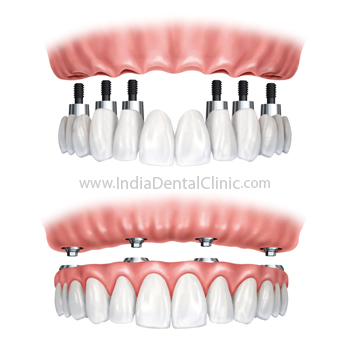Oral Cancer
More On Oral & Maxillofacial Surgery
About OMF SurgeryCleft Lip & Palate
Cosmetic Jaw Surgery
TMJ-TMD Treatment
Orthognathic Surgery
Wisdom Teeth
Anesthesia
An Overview – Oral Cancer Treatment in India
An overview by India Dental Clinic and listing information of oral cancer treatment surgery centers in India and maxillofacial dental surgery hospitals performing oral cancer surgery in India. Cancer in the oral region is normally mentioned as head and neck cancers. Oral cancer is part of a group of cancers that can develop in any part of the oral cavity or oropharynx. It is often experienced that most oral cancers begin in the tongue and in the floor of the mouth. Almost all oral cancers begin in the flat cells (squamous cells) that cover the surfaces of the mouth, tongue, and lips. These cancers are called squamous cell carcinomas. The oral cavity and oropharynx have many parts:
• Lips
• Lining of your cheeks
• Salivary glands (glands that make saliva)
• Roof of your mouth (hard palate)
• Back of your mouth (soft palate and uvula)
• Floor of your mouth (area under the tongue)
• Gums and teeth
• Tongue
• Tonsils
The process of spread (metastasizes) of oral cancer usually follow through or appear the lymphatic system. Although specific causes for oral cancer have not been found, there are considerable risk factors. Cancer cells that enter the lymphatic system are carried along by lymph, a clear, watery fluid. The cancer cells often appear first in nearby lymph nodes in the neck. Cancer cells can also spread to other parts of the neck, the lungs, and other parts of the body. When this happens, the new tumor has the same kind of abnormal cells as the primary tumor. For example, if oral cancer spreads to the lungs, the cancer cells in the lungs are actually oral cancer cells. The disease is metastatic oral cancer, not lung cancer. It is treated as oral cancer, not lung cancer. Doctors sometimes call the new tumor "distant" or metastatic disease.
The exact reasons why cancers develop are still under continuous study worldwide including dental centers and dental hospitals in India. However, some indications are traced into family history of oral cancer, exposure to the sun without protection, the use of tobacco and alcohol consumption. Some studies show that not eating enough fruits and vegetables may increase your chances of getting oral cancer, as you are inadvertently depriving yourself from their cancer fighting properties. Refraining from the use of tobacco, limiting your alcohol intake, wearing sunscreen and maintaining a good diet is the best way to prevent oral cancer.
Understanding Cancer
India Dental Clinic makes a brief attempt for the patients to understand cancer, as it is a vast subject to fully explain in a limited space. Moreover, every individual case is different from the other in causes. Cancer begins in cells, the building blocks that make up tissues. Tissues make up the organs of the body. Normally, cells grow and divide to form new cells as the body needs them. When cells grow old, they die, and new cells take their place. Sometimes this orderly process goes wrong. New cells form when the body does not need them, and old cells do not die when they should. These extra cells can form a mass of tissue called a growth or tumor.
Tumors are defined as benign or malignant:
Benign tumors are not cancer:
• It is rarely ever that benign tumors are life-threatening.
• The removal of benign tumors is done easily, and they usually do not grow back.
• Cells from benign tumors neither invade the tissues around them, nor do they spread to other parts of the body.
Malignant tumors are cancer:
• Malignant tumors may prove life-threatening as they are generally more serious than benign tumors.
• Malignant tumors sometimes grow back even after their removal looks successful.
• Malignant tumor cells can invade and damage nearby tissues and organs.
• There is every possibility that the cells from malignant tumors can spread to other parts of the body. The cells spread by breaking away from the original cancer (primary tumor) and entering the bloodstream or lymphatic system. They invade other organs, forming new tumors and damaging these organs. The spread of cancer is called metastasis.
Common symptoms of oral cancer
The visible signs could be of patches inside your mouth or on your lips that are white, a mixture of red and white, or red. These white patches (leukoplakia) are the most common, which sometimes become malignant. Mixed red and white patches (erythroleukoplakia) are more likely than white patches to become malignant. Red patches (erythroplakia) are brightly colored, smooth areas that often become malignant. Similarly, you should be concerned about a sore on your lip or in your mouth that won't heal; bleeding in your mouth; loose teeth; difficulty or pain when swallowing; difficulty wearing dentures; a lump in your neck; an earache. Most often, these symptoms do not mean cancer. An infection or another problem can cause the same symptoms.
These are some of the symptoms if you find are present, you should visit your dentist and get tested. These symptoms do not conclusively indicate presence of cancer, but it is wise to be safe and sure. During your dental exam, your doctor may order a biopsy (taking sample cells from the abnormal section inside your mouth), which is the only way to ensure that the abnormal tissue is not cancer.
Treatment for oral cancer in India
Staging
In case of biopsy confirming presence of cancer, the dentist would need to know the stage (extent) of its spread to plan the best treatment. Staging may require lab tests. It also may involve endoscopy. The doctor may also order one or more imaging tests like Dental X-rays, Chest X-rays, CT scan, and MRI.
Treatment awareness
The shock of knowing presence of cancer apart, it may be good idea for many people with oral cancer to increase the self awareness and also take an active part in knowing treatment choices and making decisions about their medical care. Your friends and family members may also participate in the discussions with your doctor, as a psychological measure. Specialists who treat oral cancer include oral and maxillofacial surgeons, otolaryngologists (ear, nose, and throat doctors), medical oncologists, radiation oncologists, and plastic surgeons. You may be referred to a team that includes specialists in surgery, radiation therapy, or chemotherapy. Other health care professionals who may work with the specialists as a team include a dentist, speech pathologist, nutritionist, and mental health counselor.
Oral Cancer Surgery
In many cases of oral cancer a surgery may be necessary to remove the tumor in the mouth or throat. Sometimes it may also necessitate the surgeon to remove lymph nodes in the neck, and other tissues in the mouth and neck may be removed as well. Patients may have surgery alone or in combination with radiation therapy (also called radiotherapy). Radiation therapy is used alone for small tumors or for patients who cannot have surgery. It may be used before surgery to kill cancer cells and shrink the tumor. It also may be used after surgery to destroy cancer cells that may remain in the area. Radiation therapy uses high-energy rays to kill cancer cells. Doctors use one of the two types of radiation therapy, external radiation or internal radiation (implant radiation). In certain cases however, even both types may be used to treat oral cancer. Chemotherapy may be used in other cases. Chemotherapy uses anticancer drugs to kill cancer cells. It is called systemic therapy because it enters the bloodstream and can affect cancer cells throughout the body. Chemotherapy is usually given by injection. It may be given in an outpatient part of the hospital in India, at the doctor's office, or at home. Rarely, a hospital stay may be needed.
Side effects of treatment for oral cancer
Depending on the location and type, the first of side effects of oral cancer treatment often faced is that it damages healthy cells and tissues as well. These side effects also include dry mouth, tooth decay, sore or bleeding gums, infection, jaw stiffness, denture problems, changes in taste and smell, changes in voice & thyroid, change in tone of skin, fatigue, etc.
Healing after Surgery
The immune system coming under increased pressure, it takes time to heal after surgery, though the recovery time taken differs from person to person. You may be uncomfortable for the first few days after surgery. However, medicine can usually control the pain, while you may still feel tired or weak for a while. Also, surgery may cause tissues in your face to swell. This swelling usually goes away within a few weeks. However, removing lymph nodes can result in swelling that lasts a long time. For a larger tumor, however, the surgeon may remove part of the palate, tongue, or jaw. This surgery may change your ability to chew, swallow, or talk. Also, your face may look different after surgery. Reconstructive plastic surgery may be done to rebuild the bones or tissues of the mouth. Reconstructive dentistry procedures may include bone grafts, fillings, crowns, bridges, and dental implants.
Nutrition and follow up
The weight loss stalks many patients after the oral cancer therapy. This can be taken care in advance by adopting the right intake of nutritional foods to build enough calories and protein to prevent weight loss, regain strength, and rebuild healthy tissues. Eating well may be difficult after treatment for oral cancer. Some people with cancer find it hard to eat because they lose their appetite and taste. Follow-up care after treatment for oral cancer is important. Even when the cancer seems to have been completely removed or destroyed, the disease sometimes returns because undetected cancer cells remained in the body after treatment. Checkups include exams of the mouth, throat, and neck. From time to time, your doctor may do a complete physical exam, order blood tests, and take x-rays. People who have had oral cancer have a chance of developing a new cancer in the mouth, throat, or other areas of the head and neck. A regular consult with dentist at India Dental Clinic is advised.
More dental deals in Other Cities

special Dental Discount
Treatments Covered-- All Ceramic Dental Crowns
- Laser Teeth Whitening
- Metal Free Crown
- Porcelain Veneer
View Details Mumbai

Implant Consultation & Treatment Planning at 150RS
Special Price - 150 (INR-Indian Rupee )Treatments Covered-
- Full Arch Implant Bridge (Lower)
- Full Arch Implant Denture (Lower)
- Dental Implant Consultation
- All-on-Four Implants
View Details Ahmedabad

Smile Makeovers At Special Discount
Special Price - 6400 (INR-Indian Rupee )Treatments Covered-
- All Ceramic Dental Crowns
View Details Lucknow

